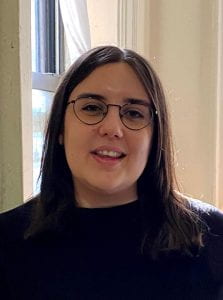 Talha Issevenler is a doctoral candidate at the Graduate Center CUNY. He teaches at City College, Macaulay Honors College, and Queens College. His research explores the ways in which temporality and historicity become the material and the topic of political rationality. In other words, his work focuses on the relationship between human and nonhuman temporality by taking timelines of social media platforms as its historical ground in formation. In 2016, he co-authored an article with Patricia Clough responding to the works of Kathleen Stewart and Mark Hansen. In 2018, he wrote an essay on the intentional decohesion in deportability. In 2020, he started a series of mourning essays on the historicity of religious experience on the heels of Maurice Blanchot.
Talha Issevenler is a doctoral candidate at the Graduate Center CUNY. He teaches at City College, Macaulay Honors College, and Queens College. His research explores the ways in which temporality and historicity become the material and the topic of political rationality. In other words, his work focuses on the relationship between human and nonhuman temporality by taking timelines of social media platforms as its historical ground in formation. In 2016, he co-authored an article with Patricia Clough responding to the works of Kathleen Stewart and Mark Hansen. In 2018, he wrote an essay on the intentional decohesion in deportability. In 2020, he started a series of mourning essays on the historicity of religious experience on the heels of Maurice Blanchot.
 Sandra Moyano-Ariza (she/her) is a fifth-year doctoral candidate in English at The Graduate Center, CUNY, in New York. Her research works at the intersection of philosophy and digital technology, with interests in the fields of affect theory, speculative philosophy, new materialisms, and feminist ontologies. She focuses on how digital technology reconfigures the human, and how this entanglement produces a new social. More specifically, her work grapples with the highly computed and accelerated experiences of love and intimacy in dating apps and their cultural representations. She is also an Adjunct Lecturer at Baruch College (CUNY) and a Writing Across the Curriculum (WAC) fellow at York College (CUNY).
Sandra Moyano-Ariza (she/her) is a fifth-year doctoral candidate in English at The Graduate Center, CUNY, in New York. Her research works at the intersection of philosophy and digital technology, with interests in the fields of affect theory, speculative philosophy, new materialisms, and feminist ontologies. She focuses on how digital technology reconfigures the human, and how this entanglement produces a new social. More specifically, her work grapples with the highly computed and accelerated experiences of love and intimacy in dating apps and their cultural representations. She is also an Adjunct Lecturer at Baruch College (CUNY) and a Writing Across the Curriculum (WAC) fellow at York College (CUNY).
Concept: Originary Technicity
The concept of originary technicity addresses the aporetic relationship between the human and the technical as new technologies redefine the conditions of the political. For the individual, digital technologies today expand the limits of experience by extending scales of perception. Within institutional contexts, digital technologies allow for a more intimate knowledge of populations through ubiquitous tracking and accelerate the movement of capital through the widespread use of machine-learning in financial markets. Algorithms also produce a displacement of political responsibility from the human to the nonhuman as their calculative processes are black-boxed and operate beyond human perception.
Given that technology constitutes time, space, and bodies inherent to any political thinking, there is a need for a renewed understanding of how technology is originary to the human condition and therefore to its sociality. In underlining the constitutive role of technics, originary technicity does not only contribute to a rethinking of the technological, but also reconfigures what it means to be human in this assemblage. As such, this paper analyzes originary technicity as a deconstructive concept that sheds light on the transformations and redistributions of capacities, roles, and affects across human/nonhuman entanglements. Our paper retraces the Derridean genealogy of the term from its inception in Socratic philosophy’s concept of the pharmakon (technology as both poison and remedy), to the work of deconstruction on the binary of human/technics, and to finally its use in the contemporary new media theories of Mark Hansen, Patricia Clough, and Arthur Bradley.